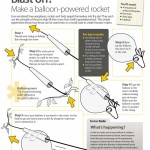
Artist's impression of giant snow machines. Image: A.Naeg/AFP/Scanpix
Building the political will
Unfortunately, there’s no guarantee that geoengineering could avoid the political setbacks that have plagued the process of curbing emissions. Nations would still have to agree to bear the cost of developing and implementing any geoengineering technology, and negotiations could be further complicated if the methods threatened to alter weather patterns. Some scientists counsel that solar radiation management is too risky to attempt, and that all efforts should focus on carbon capture and emissions control.
But many researchers believe that we should pursue all options in an effort to curb climate change. “Carbon capture would certainly be better in some ways than solar radiation management,” says Stephen Salter, a professor of engineering design at the University of Edinburgh in Scotland who is currently working on a salt-seeding project to increase cloud cover and reflect more of the sun’s radiation back into space. “But the atmosphere weighs five million gigatons. Even if you pass only one third of it through carbon-capture machines, you have a lot of moving to do, and it isn’t going to be quick.” According to Salter, solar radiation management is better equipped to handle immediate problems like the melting of Arctic ice and the thawing of permafrost, a process that will launch millions of tons of methane and CO2 into an already overburdened atmosphere. Neither method should be ignored, Salter says: “We need to design and test the necessary equipment so that we can get geoengineering under way very quickly if it is needed.”
Although geoengineering won’t solve all of our climate-change problems, it could become a major player in our efforts to stave off a global catastrophe. “There is a 50-50 chance that curbing emissions will be politically unsuccessful,” says Thomas Schelling, a Nobel laureate and professor of economics at the University of Maryland, and a longtime proponent of geoengineering research. “If experiments demonstrate that geoengineering is effective and safe, it will likely become irresistible at some stage.”
Read more: For the full article, see Science Illustrated magazine, July/August 2010 Australian edition.






